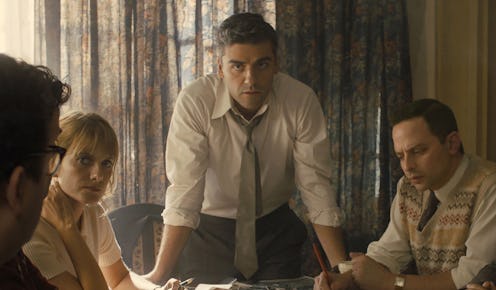Entertainment
The Real Story Behind Oscar Isaac's New Thriller 'Operation Finale' Is Absolutely Riveting
Spoilers ahead. On May 23, 1960, Israel's Prime Minister David Ben-Gurion announced that Nazi war criminal Adolph Eichmann had been captured in Argentina, and would stand trial in Israel for his complicity in the Holocaust. A new film follows Israeli intelligence officers as they tracked, found, and plotted how to capture Eichmann and bring him to justice, but is Operation Finale a true story, or a historical exaggeration? Surprisingly, the least-believable elements of the film are the firm historical facts, while the emotional meat of it is where the movie takes liberties.
Strange as it may seem that a main architect of the Nazi "final solution" was hiding in plain sight as a lowly auto plant employee, that's how Israeli intelligence agency Mossad found Eichmann, living in Argentina under the assumed name "Ricardo Klement" and working for Mercedes-Benz. History reports how, after escaping from an American POW camp, Eichmann made his way to Argentina with the help of Nazi sympathizers, hiding in monastic safe houses across Europe even as his collaborators testified to his essential role in identifying and transporting millions of Jewish and other "undesirable" people to their death in concentration camps. After arriving and living safely in Argentina for two years, Eichmann sent for his family in 1952.
A half-Jewish immigrant named Lothar Hermann moved to Argentina in 1938 to escape the Nazis, and in 1956, his daughter began dating a young man named Klaus Eichmann, who boasted about his father's big role in the war. It's here that Operation Finale picks up, with Mossad sending agents into the field to get more information, photographs, and proof that this might be the Adolf Eichmann.
In the new film, operative Rafi Eitan (played by comedian Nick Kroll in a serious turn) has to argue the importance of bringing Eichmann (Ben Kingsley) to justice to those who feel Israel had more pressing matters to ensure its future than using resources to settle old grudges. In real life, Eitan himself initially agreed with the latter sentiment. Speaking to The Daily Beast, Eitan explained that Israel's early years were shaky; with many immigrants coming in from Cold War enemy territory to establish the nation, “We had to check everyone to understand if he was a spy or not. This was the first priority—not capturing Nazis.” But by the '50s, with Israel more established and able to reprioritize, Eitan was able to head a team to oversee the capture of Adolf Eichmann.
The actual details of the planning and capturing in the film are mostly accurate, including Peter Malkin (Oscar Isaac) physically grabbing Eichmann and taking him to a nearby Mossad safe house. But the movie turns what in real life was a minor matter into the major theme of the entire film. In the film, everything hinges on the team convincing Eichmann to sign a paper stating he is willingly going to Israel to stand trial, otherwise the airline set to fly the team back would refuse to do so. In real life, Eichmann was beyond obedient. Isser Harel, the Mossad director who gave orders to the team pictured in Operation Finale, observed in The Nazi Hunters that “[Eichmann] behaved like a scared, submissive slave whose one aim was to please his new masters.” He signed the papers without complaint.
The filmmakers understandably couldn't resist adding Hollywood gloss to real life, inventing moments of drawn out tension as the team gets the drugged Nazi into costume and through security to their waiting plane. The movie also altered real-life doctor Yonah Elian into a romantic foil, Hanna Elian (Melanie Laurent).
In reality, the operation went smoothly and quietly, as planned. Eichmann was brought back to Israel, and despite Argentinian demands they return the captured citizen, Eichmann stood trial. It was one of the first fully televised trials, as NPR reports, and for most of the world, a first exposure to the full horrors of the Holocaust as witness after witness came forward and testified against Eichmann's orchestration. Operation Finale ends with actual trial footage and a black title card noting Eichmann's ultimate fate, tying fiction immediately back into fact.
